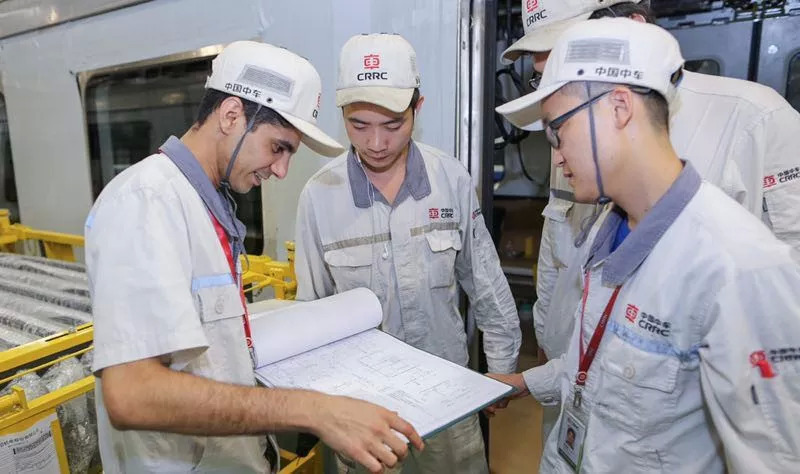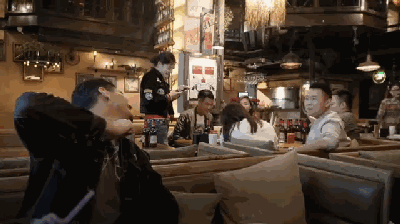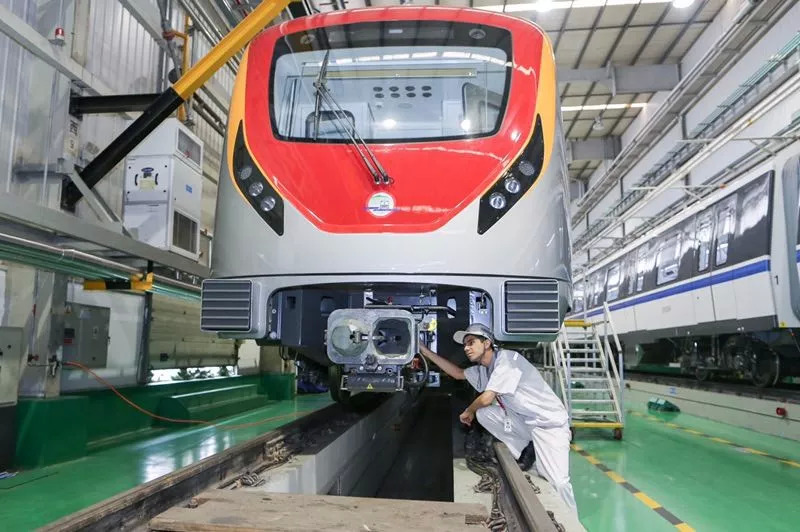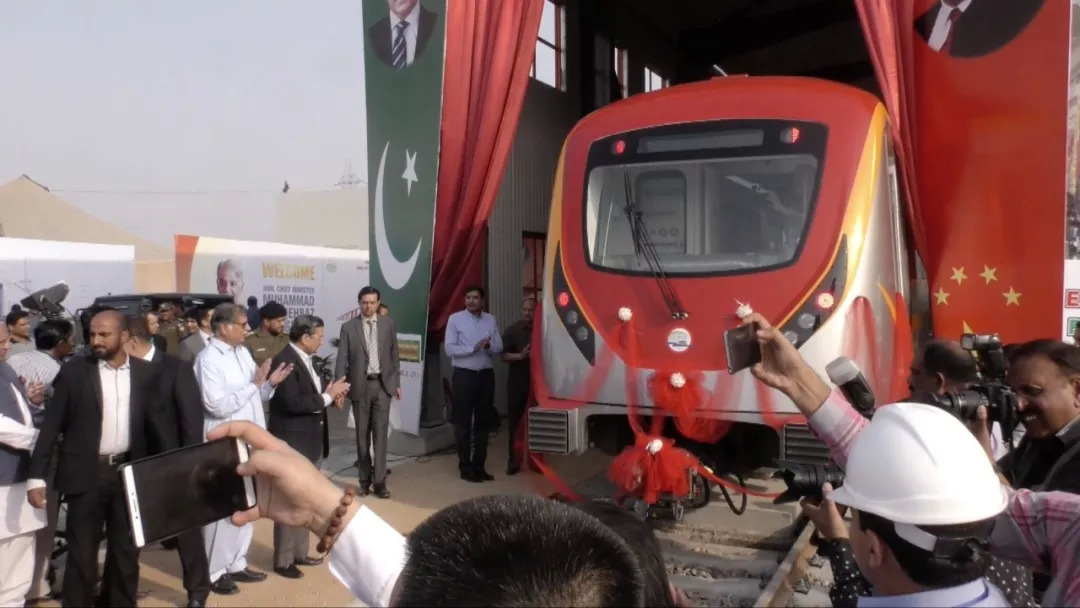CGTN 2019-04-26 09:32:39
“国之交在于民相亲,民相亲在于心相通。”
“一带一路”不仅是经济、贸易之路,也是文明、友谊之路。
在过去几年中,“一带一路”参与国家的民众们也积极投身到建设当中来,共建"民心相通桥", 共享发展成果。
在本期《丝路人》系列视频中,来自巴基斯坦的电力工程师Max讲述了他的“一带一路”故事。
Closer cooperation on infrastructure, the economy and technology between China and partner nations has thrived since the launch of the Belt and Road Initiative (BRI) in 2013.
Thanks to these deepening ties, more Chinese companies have expanded their operations overseas.
CGTN is sharing personal stories of three employees who work in Chinese companies that benefit from the BRI.
In the seventh episode of "The Faces", Max from Pakistan shares his experience of working in China to produce the first metro train for his home country.

远离家乡,来到距家4000多公里的中国城市株洲,28岁的巴基斯坦工程师Max并没有太多的离愁别绪。相反,他因为能在中国参与生产巴基斯坦的首辆地铁列车而感到自豪。
Max曾在西安交通大学电力工程专业学习。硕士毕业后,Max被中车株洲电力机车公司录用。他也是首个被该公司录用的外籍毕业生。随后,Max参与到了中巴“橙色列车”项目中。
More than 4,000 kilometers away from his home country Pakistan, 28-year-old Max is hard at work manufacturing trains. Some of the subway trains he is helping with will be exported to countries along the Belt and Road countries.
Max is the first foreign graduate whom the CRRC (China Railway Rolling Stock Corp.) Zhuzhou Locomotive Company has hired. He got the job after graduating with a master's degree in electrical engineering from Xi'an Jiaotong University.
浓眉大眼的Max在鲜见外国人的株洲小有名气。回想到刚来中国时,Max还因为语言障碍感到过孤独。但中国朋友们对于他这位“巴铁”的热情成为他努力学习的动力,他的中文水平突飞猛进。两年前,他甚至还参加了一个相声表演,“炫耀“了一下他的普通话。
Max works in Zhuzhou, a prefecture-level city in the southern province of Hunan, where very few foreigners can be seen in the street. With his big eyes and bushy eyebrows, sometimes people even treat Max like a celebrity. Whether he is walking in the street, or eating his meal in a restaurant, locals are always keen to talk to him. And the affection grows even deeper when they learn he's from Pakistan.

"Batie," which literally means "Pakistan iron," is a popular term of endearment reserved for Pakistanis. Iron in China symbolizes a close bond or friendship. Max has already gotten used to his nickname and has become very fond of it.
"People here are so welcoming, but this made me feel that the language barrier was my only problem," Max said. With very few of his countrymen working for the company or living in the city, and unable to fully converse in Chinese, Max felt somewhat isolated.
There are no shortcuts when it comes to learning languages. So every day, Max read and wrote Chinese characters onto paper a thousand times, all to become fluent.

His hard work has paid off. He now converses in Mandarin both at work and in his daily life. Two years ago he even attended a talk show event with his Chinese colleagues to "show off" his Mandarin.
但最让他骄傲的不是中文水平的提高,而是能参与自己国家的交通基础设施建设。
Max说自己第一次在中国坐地铁时,觉得这种交通方式简直太棒了,方便快捷,无堵车压力。他从未想过有一天,自己居然有机会参与建造巴基斯坦的首辆地铁列车。
But what makes him the most proud here is not improving his language skills, but playing a role in improving his country's transport infrastructure.
The first time Max took the subway in China will remain fresh in his memory. "I thought, 'Wow, this really is a very good means of transportation. It is convenient and fast, with no traffic jam, no headache.'" At the time, he didn't realize that one day he would be helping to make his country's first metro train.
“橙色列车”项目是中巴经济走廊首个签约的基础设施项目,也是“一带一路”建设的重要组成部分。“橙色列车”项目也将为巴基斯坦搭建起首个现代化铁路高速交通系统。
During the year Max started to work for CRRC, a contract was signed between China and Pakistan to deliver the "Orange Line Metro Train" in Lahore. This project is a component of the China-Pakistan Economic Corridor, which is a significant part of China's Belt and Road initiative. The Orange Line will be Pakistan's first modern rail-based mass rapid transit system.
"Thanks to the loan from the Belt and Road Initiative, and after lengthy negotiations, the project has been signed," Zhong Jinlin, deputy director of overseas marketing at CRRC, told CGTN. "It is the company's first China-Pakistan project to get signed under the Belt and Road Initiative. We have been facing very tight deadlines. But Max is particularly helpful and passionate even though sometimes he has had to work overtime."
"Of course, everyone will feel proud if you are doing something for your country, especially when you are abroad," Max said.

在项目中,Max常常扮演着“双重角色”。作为电力工程师,他在工作中发挥专业所长;作为巴基斯坦人,他还能“化身”沟通的桥梁。基于自己对巴基斯坦交通状况的了解,Max能够快速解决两边在协商中遇到的问题。有时,他还承担了翻译的工作。
As an electrical engineer, Max brought his technical knowhow to the project, but as a Pakistani, he also acted as a "middle man." Familiar with the local transport operation, he could quickly coordinate between the two sides if there were any problems or queries. He also helped with translating instructions on the train.

当首辆建造好的列车运抵巴基斯坦时,Max见到了热情围观的群众。大家都迫不及待地想要乘坐这辆列车。
他们不用等太久。预计今年7月份,“橙色列车”就会开通运行了。
And when the first trains were delivered, Max was there to help with handing them over to his compatriots. The brightly colored trains attracted thousands of people. “Every day, they will come and cover the train. They keep saying ‘Let me see, let me see the train,'" Max still remembers the jubilant crowd while the trial operation was being conducted on the rails. "They just can't wait to get into the train."
And they won't have to wait any longer as the Orange Line train is likely to go into official service starting July this year. And Max's contribution to this China-Pakistan project has not gone unnoticed. Zhong told us his company saw Max's hiring as a success, and “since then, we've hired more foreign employees like him."
责编:周杨
来源:CGTN
我要问



 下载APP
下载APP 报料
报料 关于
关于
 湘公网安备 43010502000374号
湘公网安备 43010502000374号